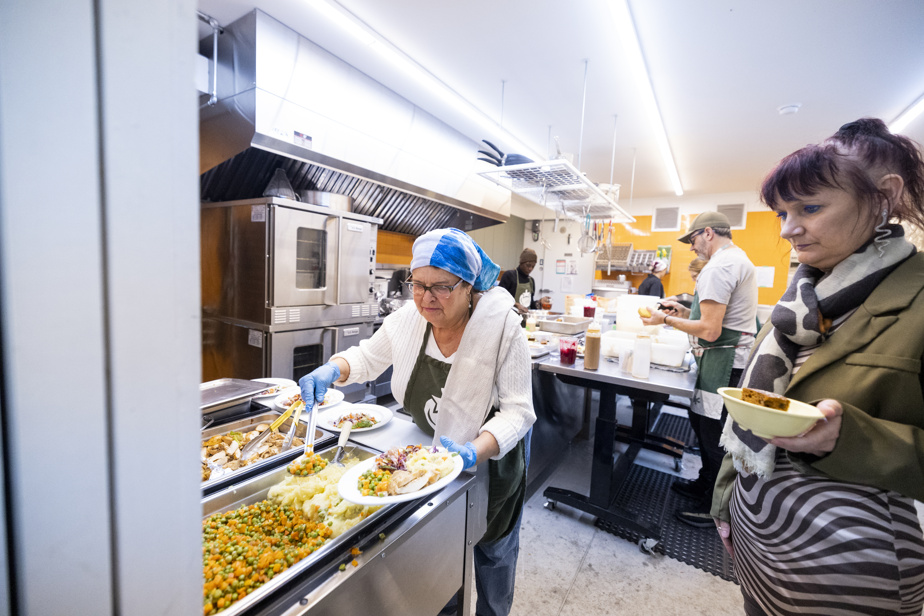The profiles of food aid users continue to evolve and their numbers to increase. Caught by the throat, more and more people are going into debt to pay for groceries.
At the small 3 Paniers grocery store in Montreal, it is more common for people to ask to pay for their purchases with a credit card. Already, the solidarity grocery store offers payment options to help those who can no longer arrive. So seeing them now take out a card because they no longer have any cash worries Sylvie Chamberland to the highest degree.
“It’s not new to see people going into debt for food. What is new is seeing how widespread it is,” explains the co-director general of the Carrefour solidaire organization, a community food center that works in the Centre-Sud district.
The problem, explains Sylvie Chamberland, is that people who enter a phase of moderate or more serious food insecurity drag on these debts for a long time and struggle to get out of it.
“People are going to take years to recover from this,” she said. These people have their heads underwater for the next few years. »
Difficult to calculate the debt rate linked directly to food, says economist Geoffroy Boucher, but several signals can support this hypothesis that food contributes to debt for part of the population.
“We see that household debt in Canada is experiencing a record increase,” begins Mr. Boucher, who is an economist at the Quebec Observatory of Inequalities. He then recalls that food is the second largest item of expenditure for families.
“And this is where we have experienced the highest price increases in the last year,” he adds. In fact, since the end of 2021, food price increases have been higher than overall inflation. »
Tuesday lunchtime, we had a holiday meal at Bols de Quartier, this café adjacent to the 3 Paniers grocery store. There, healthy eating is within everyone’s reach.
We went there last year to see the increase in traffic, which came partly from workers with income and students. This year, another clientele has increased and it’s impossible not to notice it in the café: children. Yes, the strike brought a few students, but the increase in children in the community café dates from before the conflict, the volunteers explain to us.
Parents who frequent the place, and love it, start taking their children there for dinner. It’s a pleasant outing and it’s also an opportunity to have a good meal at a very low price, which is increasingly difficult in a restaurant.
The café operates on the principle of voluntary contribution. Everyone is very well received there, regardless of means. And the number of customers is growing continuously.
There are workers who arrive at midday and leave the amount they would have paid elsewhere for this same meal, and there are those who instead benefit from an essential respite.
Statistics confirm the increase in children as beneficiaries of food aid in Quebec and, in this sense, food inflation risks leaving strong traces, says Geoffroy Boucher.
“There is a huge amount of literature, even economic literature, on the link between food insecurity and the development of toddlers,” explains the economist. And it starts during pregnancy since the mother’s diet has a determining impact on the child’s development. »
In addition to the direct effects on the child’s physical health and their school career, Geoffroy Boucher specifies that children develop eating habits from a young age that will follow them throughout their lives.
“If they have to deprive themselves of certain more nutritious foods or if they are less exposed to a variety of foods due to price constraints, that will impact their eating habits for the rest of their lives. This is particularly concerning because data shows that food insecurity is on the rise among people under the age of 18, including children. »
According to the latest Hunger Report from Quebec Food Banks, 35% of bank beneficiaries are now children. The 2023 edition of the document contains some other heartbreaking figures, including the fact that since 2019 there has been a 33% increase in monthly requests for assistance.
When it publishes these ever more alarming figures, the organization wonders if this could lead to a desensitization of public opinion. That doesn’t seem to be the case, says Martin Munger. “We felt the opposite this year,” he says.
The fact that food inflation affects everyone, even the well-off, probably further arouses public opinion in general.
“I think it helps when people realize that if they have difficulty at the checkout, at the grocery store, the situation is even more difficult for those who have lower incomes,” says Martin Munger.
